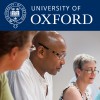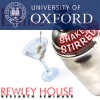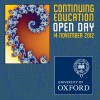
Relevant Links
Dr Tara Stubbs has recently completed a monograph, American Literature and Irish Culture, 1910–1955: the politics of enchantment (MUP, 2013). The monograph discusses how modernist American writers (including Fitzgerald, Moore, O’Neill, Steinbeck and Stevens) engaged with Irish culture, and underlines the importance of Ireland as a locus of inspiration for American modernism.
Associated projects include an ongoing, collaborative project on ‘The idea of influence in American literature’, which began with a conference at Oxford (March 2010); this led to a ‘special issue’ of Comparative American Studies (June 2011). Another project discusses the modernist Irish poet and art critic Thomas MacGreevy. The chapter, ‘“So kind you are, to bring me this gift”: Thomas MacGreevy, American modernists and the gift of “Irishness”’, will be published in The Life and Work of Thomas MacGreevy: A Critical Reappraisal, ed. Susan Schreibman (Continuum, 2013). I have also written a chapter, ‘W.B. Yeats and the Ghost Club’, on Yeats’s involvement in the esoteric London society; this will be published in Irish Writing London, Vol. 1, ed. Tom Herron (Bloomsbury, 2013).
Her new research is a biographical project on the publishing career of Harold Macmillan, for which she has recently been awarded a John Fell Fund award. Entitled ‘Macmillan and his authors: a reassessment of the publishing career of Harold Macmillan’, it will use Macmillan’s correspondence with a range of high-profile authors to illustrate his importance to early twentieth century letters. Biographers have tended to dismiss Macmillan’s years in publishing (her research will focus mainly on 1921–38) as a dull preamble to his political career, but letters reveal that he was a shrewd publisher, helping shape the way we read writers like Hardy, Kipling, O’Casey and Yeats.
| # | Episode Title | Description | People | Date | |
|---|---|---|---|---|---|
| 8 | Maud Gonne MacBride: feminist, agitator, muse | Kellogg Fellow Dr Tara Stubbs introduces us to Maud Gonne Macbride: feminist, agitator, muse. | Tara Stubbs | 25 Apr 2020 | |
| 7 | Irish Nationalist Women, 1900-1918 | An interdisciplinary panel of scholars discuss Dr Senia Paseta's book | Senia Paseta, Tara Stubbs, Desmond King, Roy Foster | 03 Dec 2014 | |
| 6 | Creative Commons | An Introduction to the Oxford University Creative Writing Summer School | A short introduction to the Oxford University Creative Writing Summer School by the Programme Director and students. | Tara Stubbs, John Collins, Dalia Hosn, Nathan Smale | 10 Mar 2014 |
| 5 | Fitzgerald beyond Gatsby | With the recent resurgence in interest in F. Scott Fitzgerald following Baz Luhrmann's imaginative film adaptation of Fitzgerald's 1925 novel The Great Gatsby have come the inevitable cliches of the 'lost generation' and the 'American dream'. | Tara Stubbs | 07 Oct 2013 | |
| 4 | Creative Commons | Decay | The presentations focus on the importance of disappearance as much as appearance, presence as well as absence, and growth in the guise of degeneration, arguing from difference perspectives for the importance of malaise or corrosion as a subject of study. | David Howard, Martin Neubert, Robert Vanderplank, Tara Stubbs | 22 May 2013 |
| 3 | Creative Commons | Decay | The presentations focus on the importance of disappearance as much as appearance, presence as well as absence, and growth in the guise of degeneration, arguing from difference perspectives for the importance of malaise or corrosion as a subject of study. | David Howard, Martin Neubert, Robert Vanderplank, Tara Stubbs | 22 May 2013 |
| 2 | Creative Commons | W.B. Yeats and the Ghost Club | Dr Tara Stubbs uses exciting new research findings to discuss the close links between Yeats's attendances at the Ghost Club during the 1910s-1920s, his (sometimes amusing) spiritualist experiments, and his poetic works. | Tara Stubbs | 19 Dec 2012 |
| 1 | Creative Commons | W.B. Yeats and the Ghost Club | Dr Tara Stubbs uses exciting new research findings to discuss the close links between Yeats's attendances at the Ghost Club during the 1910s-1920s, his (sometimes amusing) spiritualist experiments, and his poetic works. | Tara Stubbs | 19 Dec 2012 |






